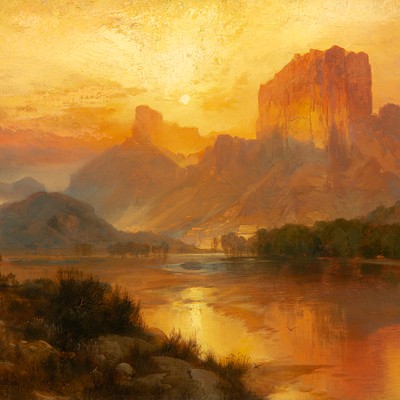Eanger Irving Couse (1866-1936); Song of the Blue Aspens [or] The Evening Flute
Lot 44
About Seller
Coeur d'Alene Art Auction
11944 North Tracey Road
Hayden, ID 83835
United States
Coeur d’Alene Art Auction specializes in the finest classical Western and American Art representing past masters and outstanding contemporary artists. The auction principals have over 100 years of combined experience in selling fine art and have netted their clients over $325 million in the last fif...Read more
Categories
Estimate:
$80,000 - $120,000
Absentee vs Live bid
Two ways to bid:
- Leave a max absentee bid and the platform will bid on your behalf up to your maximum bid during the live auction.
- Bid live during the auction and your bids will be submitted real-time to the auctioneer.
Bid Increments
| Price | Bid Increment |
|---|---|
| $0 | $250 |
| $5,000 | $500 |
| $10,000 | $1,000 |
| $20,000 | $2,500 |
| $50,000 | $5,000 |
| $100,000 | $10,000 |
| $200,000 | $25,000 |
| $500,000 | $50,000 |
| $1,000,000 | $100,000 |
About Auction
By Coeur d'Alene Art Auction
Jul 25, 2020
Set Reminder
2020-07-25 15:00:00
2020-07-25 15:00:00
America/New_York
Bidsquare
Bidsquare : Fine Western & American Art
https://www.bidsquare.com/auctions/coeur-dalene/fine-western-american-art-5263
The 2020 Coeur d'Alene Art Auction to be held July 25 in Reno, Nevada, will feature 264 selections of unparalleled quality in Western paintings and sculpture from historical and contemporary artists such as Charles M. Russell, Henry Farny, Thomas Moran, Edward S. Curtis, Carl Rungius, and more. Coeur d'Alene Art Auction info@cdaartauction.com
The 2020 Coeur d'Alene Art Auction to be held July 25 in Reno, Nevada, will feature 264 selections of unparalleled quality in Western paintings and sculpture from historical and contemporary artists such as Charles M. Russell, Henry Farny, Thomas Moran, Edward S. Curtis, Carl Rungius, and more. Coeur d'Alene Art Auction info@cdaartauction.com
- Lot Description
Eanger Irving Couse (1866-1936)
Song of the Blue Aspens [or] The Evening Flute
oil on canvas
29 x 24 inches
signed lower right
VERSO
Titled
Label, Fenn Galleries, Santa Fe, NM
Label, Panhandle-Plains Historical Museum, Canyon, TX
According to historian Virginia Couse Leavitt, “Couse was fond of depicting the contrasting effects of moonlight and firelight in a single canvas. He handles this with particular success in this painting of an Indian playing his flute in a moonlit aspen grove. The Indian stands beside a fire he has built in the woods, his lithe body echoing the trunks of the aspen trees behind him. The warm light from the fire envelopes the fringed leggings and beaded moccasins that clothe his lower body, while his upper body is cast in shadow against the blue moonlit forest behind him. As he plays his flute, the Indian has tipped his head back and closed his eyes. The artist has created a visual effect that palpably evokes the haunting sound of the flute drifting into the quiet evening air.
“Around 1928, Leandro Bernal of Taos Pueblo posed for a number of Couse’s major paintings and he was the model used in this painting. Song of the Blue Aspens remained in Couse’s estate after the artist’s death and was not sold until the late 1980s. In 1976 it was included in the Couse Retrospective at the Panhandle-Plains Historical Museum in Canyon, Texas. There is no record of Couse’s original title, although Song of the Blue Aspens was the title used by his son, Kibbey, in the catalogue for the 1976 Retrospective. (The alternate title of The Evening Flute was given by Nicholas Woloshuk in his 1976 book about Couse).
“Couse was primarily a figure painter, well trained in the academic tradition at the National Academy of Design in New York and then at the Académie Julian in Paris. Consistently, throughout his career, he was interested in painting the qualities of light, which in his case led to an interest in Tonalism. After arriving in New Mexico, he adapted this style of painting, which relied on a color scheme based on one predominant hue, to his brilliant firelights and moonlights. Tonalism also involved a mood of quietism, which was ideal for Couse’s interest in the spiritual qualities of Native American life. These qualities of Tonalism are well demonstrated in Song of the Blue Aspens.”
PROVENANCE
Santa Fe Village Art Museum Collection, Santa Fe, NM
Private Collection, Tucson, AZ
EXHIBITED
Green Mountain: E. I. Couse in Taos, Panhandle-Plains Historical Museum, Canyon, TX
LITERATURE
Nicholas Woloshuk, E. Irving Couse (Santa Fe, NM: Santa Fe Village Museum, 1976) p 71, illustratedSurface condition is excellent. Two spots of inpainting to right of flute.Condition
- Buyer's Premium



 EUR
EUR CAD
CAD AUD
AUD GBP
GBP MXN
MXN HKD
HKD CNY
CNY MYR
MYR SEK
SEK SGD
SGD CHF
CHF THB
THB![Eanger Irving Couse (1866-1936); Song of the Blue Aspens [or] The Evening Flute](https://s1.img.bidsquare.com/item/l/6581/6581315.jpeg?t=1JKRQo)
![Eanger Irving Couse (1866-1936); Song of the Blue Aspens [or] The Evening Flute](https://s1.img.bidsquare.com/item/s/6581/6581315.jpeg?t=1JKRQo)











